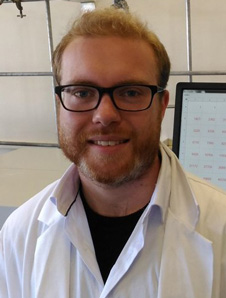
An Otago PhD student has been granted $25,000 to work on a treatment to deliver birthmark medications through the skin.

Sean Mackay.
Final year Otago PhD student Sean Mackay has received a $25,000 grant to aid the development of 'Squish', a targeted treatment for strawberry birthmarks which affect approximately 1 in 10 infants.
Mr Mackay is part of a team of talented scientists and clinicians from Otago, the Gillies McIndoe Research Institute and the Centre for the Study and Treatment of Vascular Birthmarks based at Hutt Hospital in Wellington, working on a targeted drug delivery system to treat strawberry birthmarks, also known as infantile haemangioma.
Twenty-five-year-old Mr Mackay says strawberry birthmarks, a type of vascular tumor, are disfiguring, can affect bodily functions and are sometimes life-threatening.
“The goal is to develop a more effective and safer approach to treating infants by delivering the drug directly into the tumours using nanotechnology to carry the drug directly through the skin, rather than administering it orally. We are literally trying to 'Squish' drugs through the skin, hence the name for the technology,” he says.
Dr Eng Tan, from Otago's Chemistry Department is the lead researcher on the project.
He says current treatment for this debilitating disorder is Propranolol, a beta-blocker, taken orally, but it can cause adverse side effects.
“Creams that go on the skin are also not effective as they don't penetrate the cells effectively to enable drug delivery as required.”
Mr Mackay says it's fantastic to be awarded the KiwiNet Emerging Innovator Funding as it will be used to optimise the technology for stability, and increase its ability to effectively transport drugs into the tumour.
"We are literally trying to 'Squish' drugs through the skin, hence the name for the technology."
Mr Mackay completed his undergraduate degree in Chemistry in 2012. He then worked as a research assistant developing targeted drug delivery systems for the treatment of neurological disorders such as epilepsy and Parkinson's disease.
In 2013 he received a doctoral scholarship to pursue a PhD in the area of nanoscale and biomedical technologies and specialises in nanotechnology, where his main research interest is in developing innovative medical technologies which control the way that drugs are administered to patients, making them more effective with less side-effects.
To date these have ranged from nanoparticles which can be remotely activated to release neurochemicals or neurochemical-like drugs in the brain to treat neurological conditions such as Parkinson's disease and Epilepsy to wound-healing hydrogels.
The grant from the KiwiNet Emerging Innovator Fund, one of 10 to help researchers take clever ideas and work with business to take to market, was made possible by a donation from the Norman F. B. Barry Foundation.
John Smith, Chairman of the Norman F. B. Barry Foundation says, “We're delighted to be able to support Sean and this very important project that could have widespread benefit to children around the world. We're delighted to see our $250,000 donation making such an important difference to a wide range of amazing research projects.”
The KiwiNet Emerging Innovator Fund, established thanks to the generous support of the Norman F. B. Barry Foundation, is available to early career researchers based at universities and Crown Research Institutes across New Zealand who demonstrate a clever new idea and a willingness to work closely with industry as they develop a prototype. Recipients also receive expert legal advice from KiwiNet corporate partners, MinterEllisonRuddWatts and IP advice from Baldwins.
